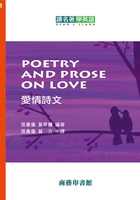
1 Shall I Compare Thee to a Summer’s Day
Shall I compare thee to a summer’s day?
Thou art more lovely and more temperate.
Rough winds do shake the darling buds of May,
And summer’s lease hath all too short a date:❶
Sometime too hot the eye of heaven shine, 5
And often is his gold complexion dimmed;
And every fair from fair sometime declines,
By chance,❷ or nature’s changing course untrimmed:
But thy eternal summer shall not fade,
Nor ❸ lose possession of that fair thou owest; 10
Nor shall Death brag thou wanderest in his shade
When in eternal lines to time thou growest.
So long as men can breathe or eyes can see,
So long lives this,and this gives life to thee.
— William Shakespere
thee [古] pron(obj) = you
thou [古] pron(subj) = you
art [古] v = are
temperate adj 溫和
lease n 租借期限
hath [古] v = has
eye of heaven n-phr 太陽
complexion n 面貌
dim v 遮暗
fair n 美好的人/事物;美色
untrim v 剝奪了裝飾(美色)
owest [古] v = owe擁有
brag v 誇口
wanderest [古] v = wander
shade n 陰影,即死亡之陰谷
growest [古] v = grow
 可否讓我來把你比作夏日
可否讓我來把你比作夏日
可否讓我來把你比作夏日?
你比夏天更可愛也更溫婉。
狂風搖撼五月嬌艷的花蕾,
夏天租借的期限未免太短:
天目有時照耀得過於灼熱, 5
他的金顏卻常被遮得暗淡;
美的事物遲早減損了美色,
因應機緣或隨天道的變幻:
可是你的長夏斷不會消逝,
也不會失去你擁有的俊美; 10
死神誇不着你徘徊他的陰影裏
當你在不朽的詩句裏與時爭輝。
只要人有呼吸,眼睛能看見,
這詩篇便活着,給予你永年。
——(英)莎士比亞
妙筆生花
 本詩結構嚴謹:頭八行陳述美好事物的短暫,第九行用But作轉折,提出相反的意思,最後押韻的雙行以警句形式概括了題旨。
本詩結構嚴謹:頭八行陳述美好事物的短暫,第九行用But作轉折,提出相反的意思,最後押韻的雙行以警句形式概括了題旨。
 詩中有兩項主要修辭手法,一為換喻法(metonymy):以a summer’s day表示the summer season,“一天”代表“一季”。另一為擬人法(personification):把Death描繪成一個人,會說話(brag),可以把人籠罩在他的陰影之下,顯得威脅性更大。
詩中有兩項主要修辭手法,一為換喻法(metonymy):以a summer’s day表示the summer season,“一天”代表“一季”。另一為擬人法(personification):把Death描繪成一個人,會說話(brag),可以把人籠罩在他的陰影之下,顯得威脅性更大。
原來如此!
這是英國大文豪莎士比亞(Shakespeare, 1564-1616)著名的十四行詩(sonnet)系列的第十八首,寫給一位俊美的青年。在亞熱帶地區長大的讀者也許會奇怪:為甚麼把心儀的對象比作炎熱難耐的夏日呢?由於地理環境不同,終年陰冷多雨的英國,夏天陽光明媚,百花盛放,是最受人歡迎的季節。儘管季節更替,時日推移,這位美男子卻可以藉着不朽的詩篇永垂不朽。
莎士比亞式十四行詩體(Shakespearean sonnet),用的是一輕音一重音構成的音步(或音節),每行五個音步,稱為抑揚五步格(iambic pentameter)。全詩由三個四行詩節(stanza)和結尾兩行對句(couplet)組成,韻式是abab-cdcd-efef-gg。
增值英語
❶ And summer’s lease hath all too short a date
 too short a date = the date is too short。把形容詞提前有強調作用:
too short a date = the date is too short。把形容詞提前有強調作用:
This is too difficult a task for me to handle.(This task is too difficult for me to handle.)這件工作對我來說太難應付了。
What he just said is too good a promise to be true.(His promise is too good to be true.)他剛提出的允諾好得令人難以置信。
❷ By chance...untrimmed...
 by chance(adv-phr),解“偶然;意外地”:
by chance(adv-phr),解“偶然;意外地”:
It was only by chance that I opened the drawer and found the diary you lost.我拉開抽屜找到你丟失的日記簿純粹是出於偶然的。
He slipped by chance.他意外地滑了一跤。
 也可以用chance on/upon(v-phr)表達偶然發現或碰巧遇見的意思:
也可以用chance on/upon(v-phr)表達偶然發現或碰巧遇見的意思:
He chanced on the solution to his problem.他偶然找到了解決問題的方法。
We chanced upon Mr Lee in the museum yesterday.我們昨天在博物館碰巧遇到李先生。
❸ Thy eternal summer shall not fade,/Nor lose possession of that fair... /Nor shall Death brag...
nor是連詞,與表示否定的詞(如not或neither)連用,解“也不;也沒有”:
He has neither visited nor written to his aunt since he left China.他離開中國以後從沒有探訪過他姑姑,也沒有給她寫過信。
I’m not going, nor is John, nor is Mary.我不去,約翰也不去,瑪麗也不去。
 neither或not不與or連用。例如× He neither visited or wrote to his aunt.在語法上是錯的。
neither或not不與or連用。例如× He neither visited or wrote to his aunt.在語法上是錯的。
Men may come and men may go,
But I go on forever.
~Tennyson~
人往人來,我卻常在
~丹尼生~